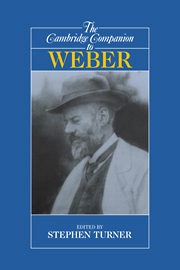Book contents
- Frontmatter
- Introduction
- PART I RATIONALITY, RATIONALIZATION, AND PSYCHOLOGY
- PART II POLITICS AND CULTURE
- PART III RELIGIONS AND THEIR ECONOMIC ETHICS
- 8 Max Weber’s Protestant Ethic and the Spirit of Capitalism
- 9 Max Weber’s Orient
- 10 Max Weber’s Ancient Judaism
- PART IV LAW AND ECONOMICS
- Further reading
- Index
8 - Max Weber’s Protestant Ethic and the Spirit of Capitalism
from PART III - RELIGIONS AND THEIR ECONOMIC ETHICS
Published online by Cambridge University Press: 28 May 2012
- Frontmatter
- Introduction
- PART I RATIONALITY, RATIONALIZATION, AND PSYCHOLOGY
- PART II POLITICS AND CULTURE
- PART III RELIGIONS AND THEIR ECONOMIC ETHICS
- 8 Max Weber’s Protestant Ethic and the Spirit of Capitalism
- 9 Max Weber’s Orient
- 10 Max Weber’s Ancient Judaism
- PART IV LAW AND ECONOMICS
- Further reading
- Index
Summary
The background
The intensity of the debate which followed the publication of Max Weber's Protestant Ethic and the Spirit of Capitalism in 1904-1905 shows how relevant the essay was considered at the time. The subject interested many of Weber's contemporaries – economists, historians, social scientists and philosophers. What, they were asking, were the origins of capitalism? What were its characteristics in its modern form? How far was it affected by religion and, more particularly, by Protestantism? The prosperity of Holland and England in the seventeenth century, attended by the economic decline of Italy and Spain, had long fascinated scholars and suggested that there was some relationship between the Reformation and economic progress. In order to confirm this theory they could turn to far earlier sources – the seventeenth-century political economist William Petty, the great exponent of the Enlightenment Montesquieu, and the historian Henry Thomas Buckle writing in the mid-nineteenth century. But they were also in search of a more modern analysis of the true nature of the relationship. In his study on suicide which appeared in 1897, the French sociologist Emile Durkheim observed that Protestants, and above all German Protestants, divorced more and killed themselves more than the members of any other confession. Such primacies, he maintained, indicated an industrial society in a particularly advanced stage, with a high standard of education and living. This, in turn, raised the question of the extent to which Protestantism might have contributed to this advance and to the development of the class on which such a society rested, the bourgeoisie.
- Type
- Chapter
- Information
- The Cambridge Companion to Weber , pp. 149 - 171Publisher: Cambridge University PressPrint publication year: 2000
- 8
- Cited by

